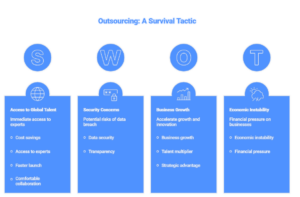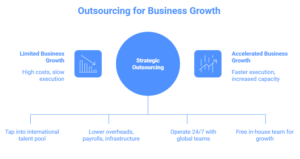Entrepreneurs — listen up! This is not a regular business year but the time when outsourcing ceases to be a choice and begins to be a matter of survival tactics. In a world where markets are growing tighter and competition is more intense than ever, smart companies are not simply reducing their costs, they are opening up new sources of growth through outsourcing for business growth.
Almost 60% of businesses indicate that outsourcing is one of their key strategies in reducing the cost of operation and improving efficiency (Stealth Agents). This is compared to previous decades where outsourcing was a peripheral move rather than a business tool.
However, cost savings is only the tip of the iceberg. Today,accounting outsourcing can provide you with immediate access to experts in the global labor market, whether it is AI-friendly developers and cloud engineers or cybersecurity experts and language-speaking support teams without the months-long recruitment process and Silicon Valley-like wage bills (LinkedIn).
Want to launch faster? Outsourcing partners are also assisting businesses to go to market as much as 25% faster by taking repetitive or specialized processes as your core team concentrates on innovation and strategy.
And as outsourced teams are now as comfortable to work with as they are at your own office because of remote collaboration tools and cloud platforms (Stealth Agents), it is almost like they conduct their work even smarter, faster and, in most cases, at a lower cost.
Outsourcing accounting services is not only a business cost reducer, but also a business growth accelerant, talent multiplier, and strategic advantage that all progressive entrepreneurs are taking a look into. Need to make your business future proof? Start thinking global.
What is Outsourcing?
As defined by Expertise Accelerated,
“Outsourcing refers to subletting an organizational function in part or entirety to a third-party vendor that specializes in the field of relevant expertise.”

Essentially, outsourcing is delegating the responsibility of a business function or part of a business function to contracted employees provided by a trusted third-party service provider. While outsourcing can apply to any third-party service provider, such as ones providing talent based in the US, in this context, we are looking for more affordable solutions from the global talent pool, which means hiring foreign talent remotely via modern technology!
That’s right, outsourcing your business functions to remote professionals through a service provider is currently the most optimal way to:
- Combat the economic instability and financial pressure permeating throughout the business landscape.
- Achieve some semblance of business growth.
In 2019, outsourcing to remote professionals had already become a pivotal strategy for growing small businesses. Clutch reported that 37% of businesses already outsourced one or more business functions. And the number has only risen since then, in the wake of the pandemic.
Since the COVID-19 pandemic started, a sizable chunk of the workforce was forced to work remotely to keep businesses afloat.
Looking at the bright side, the pandemic was a great learning moment for the world, as we saw precisely how viable remote work was.
Looking at the data compiled by Teambuilding.com, we can see that remote work was an outstanding success as a business practice, and a large percentage of businesses have stayed with it even after lockdowns ended. Therefore, at this point, there should be no doubt in people’s minds when it comes to the viability of remote work, as it has been demonstrably a resounding success.
Is Offshore Outsourcing and Remote Staffing Safe?
Regardless of the success or failure of remote work as a concept, one of the major sentiments echoed by the business community is the potential security concerns when hiring overseas professionals.
These concerns are completely valid, and a million different things could go wrong by hiring someone overseas. But the same can be said for hiring someone in-house.
One of the biggest myths around outsourcing is that it is somehow less safe than an in-house solution. This is patently untrue, simply because of the fact that regardless of the physical presence of an employee, you incur the same amount of risk when it comes to divulging confidential company data. For example, whether it’s an accountant in the office or a hundred miles away, there is an equal chance of malicious activity because they have equal access to the data.
In fact, there is a case to be made that outsourced professionals are far more secure than in-house professionals because they have a middle-management company facilitating employment and guaranteeing transparency and professional integrity.
A third-party firm will be contractually liable and can be legally penalized for misusing your data or defrauding you, so will take great care to vet trusted professionals and enforce strict internal control and monitoring to ensure there is no funny business happening. Meanwhile, in-house professionals are given a wider berth to operate in and face a significantly lesser degree of scrutiny, and so have more chances to pull a fast one on you.
There are a number of similar concerns and reservations that small businesses may have against offshore outsourcing, and while we can’t address them all here, Expertise Accelerated publication titled “Outsourced Accounting: Risks and Risk Management” is a great analysis of the risks of outsourcing and a must read for entrepreneurs today as outsourcing becomes the solution to the labor crisis.
Why Outsourcing Has Become a Powerhouse Strategy for Business Growth:
Here are a few reasons why outsourcing your major tasks will help your company thrive in an unprecendented manner:
1.Outsourcing Is Now a Business Growth Strategy and no longer a Back-Up Plan:
Outsourcing officially entered the mainstream in 2026. It has been reported that more than 70 percent of companies in the world currently outsource at least one of the core functions and incredible 80 percent of SMBs use outsourced teams in performing the important functions. This makes us know something significant, i.e. nowadays outsourcing is not something a business does in a desperate situation; it is what it does in an intelligent situation.
Outsourcing is not only being embraced by companies today as a means to reduce costs, but to make them more flexible:
- They have direct access to professionals that they are unable to employ locally.
- They do not go through lengthy recruitment processes which slack development.
- They are able to increase and decrease teams without structural disturbances.
The mere rate of adoption is an indication of change in mindset. Outsourcing is no longer a nice-to-have service in 2025: it is a pillar of business operations in the modern business environment next to cloud computing and automation.
2.Outsourcing Market Is Booming — Evidence That Companies Are finding value:
The world outsourcing market has now come to be regarded as niche. It is today USD 729854B strong (2025 estimate) and growing. This type of continued growth is only achieved when the companies are continually realizing a payoff.
Why is the market booming?
On the one hand, due to outsourcing:
- Talent deficits: Businesses tap into international talent rather than vying on the same pool of the high-cost local workers.
- Cost compression: Outsourcing lowers overheads, payrolls and infrastructure costs all at the same time.
- Speed-to-execution: Global teams enable the firms to operate 24 hours.
- The sheer size of the market has a tale to tell: businesses all over the globe are placing high bets on outsourcing as it provides a repeatable, quantifiable, scalable growth.
This is not a fad, it is a permanent world-wide change in the way companies form teams and provide value.
3.Outsourcing Provides Quantifiable Business Benefits:
There are a lot of entrepreneurs who believe that outsourcing is only about money saving. And sure – 30-60 percent savings of costs is a great thing. Nevertheless, the actual advantage in 2025 goes much deeper.
Outsourced businesses report:
Faster Execution
Outsourced teams assist the firms in saving 25 per cent of the time-to-market that is, products, campaigns as well as projects that are launched sooner than the competitors.
Increased Capacity to Operate
Companies benefit from:
- task specialization
- 24/7 workflow capability
- and in-built experience of professional people who carry out the same tasks with dozens of clients.
Their effectiveness becomes your effectiveness.
Instant Scalability
Need 1 person? Easy. Need 10? Done.
There is no procrastination in recruiting, no delay in the onboarding process, just plug and play professionals who are ready to work.
Enhanced Attention on the Management Team
When specialists are dealing with repetitive, technical or specialized workload, the in-house team is finally freed to do what actually produces growth: innovation, sales, strategy, customer relationships.
With the world becoming competitive , such benefits can be the difference between a business that survives in the market and the business that grows.

The Best Business Functions to Outsource
Accounting
Stating the obvious, predominantly desk-based jobs are the best to outsource to offshore remote professionals. Accounting is an especially popular business function to outsource among small businesses, thanks to the extravagant costs that come with a professional accountant.
On top of the sky-high cost of an in-house accountant, you have to consider that accounting is the backbone of the business.
You simply cannot go long in these economically unforgiving times without an accountant holding your hand. Whether it be outsourced accounts payable, outsourced accounts receivable, or even just outsourced bookkeeping, an accountant is better than no accountant.
This is why accounting shares the top spot with IT as the most outsourced business function today. Outsourced accounts payable is an especially good idea because your AP function needs someone who knows their accounting and finances to deal with vendors and suppliers and negotiate relations. While less vaunted, accounts receivable are still a very important business process, as debt collection and cash flow generation keep the lights on.
Information Technology (IT)
The IT department is the other major business function that tops the list. IT professionals also cost a hefty amount, and as we saw with the tech giants at Silicon Valley, they are just not affordable anymore.
Like accounting professionals, IT specialists operate entirely in the digital space and are perfect for remote work. Most foreign countries, especially Asian countries, have vast swathes of IT professionals in the job market, and their qualifications are nothing to sneeze at. With some of the finest IT talent in the world available to you at a better price remotely, who wouldn’t jump at the chance to hire such professionals and boost business growth?
Conclusion
Outsourcing is the future of business. Many of the greatest minds in the business landscape have realized that the key to success lies outside the US. And they have begun investing in global talent to stimulate business growth.
With recessionary threats looming behind our shoulders, the best way to hedge against these oppressive forces is to start outsourcing now! Whether it be something as simple as accounts payable outsourcing or outsourcing the whole IT department, take the plunge and give it a shot before it’s too late!

